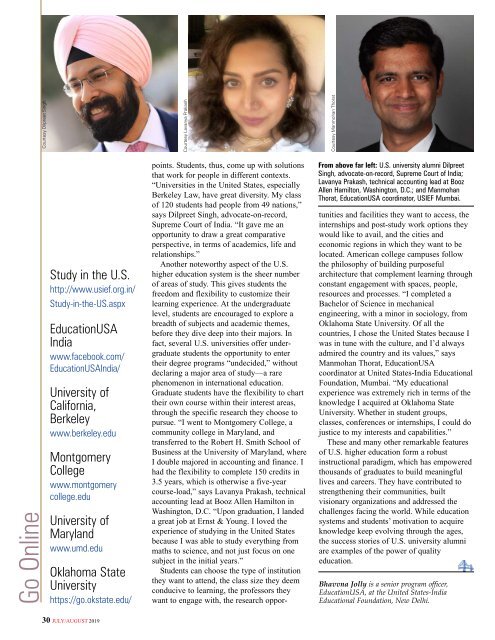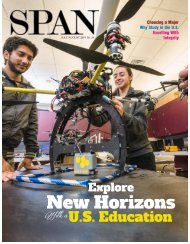July-August 2019
Create successful ePaper yourself
Turn your PDF publications into a flip-book with our unique Google optimized e-Paper software.
Courtesy Dilpreet Singh<br />
Courtesy Lavanya Prakash<br />
Go Online<br />
Courtesy Manmohan Thorat<br />
Study in the U.S.<br />
http://www.usief.org.in/<br />
Study-in-the-US.aspx<br />
EducationUSA<br />
India<br />
www.facebook.com/<br />
EducationUSAIndia/<br />
University of<br />
California,<br />
Berkeley<br />
www.berkeley.edu<br />
Montgomery<br />
College<br />
www.montgomery<br />
college.edu<br />
University of<br />
Maryland<br />
www.umd.edu<br />
Oklahoma State<br />
University<br />
https://go.okstate.edu/<br />
From above far left: U.S. university alumni Dilpreet<br />
Singh, advocate-on-record, Supreme Court of India;<br />
Lavanya Prakash, technical accounting lead at Booz<br />
Allen Hamilton, Washington, D.C.; and Manmohan<br />
Thorat, EducationUSA coordinator, USIEF Mumbai.<br />
points. Students, thus, come up with solutions<br />
that work for people in different contexts.<br />
“Universities in the United States, especially<br />
Berkeley Law, have great diversity. My class<br />
of 120 students had people from 49 nations,”<br />
says Dilpreet Singh, advocate-on-record,<br />
Supreme Court of India. “It gave me an<br />
opportunity to draw a great comparative<br />
perspective, in terms of academics, life and<br />
relationships.”<br />
Another noteworthy aspect of the U.S.<br />
higher education system is the sheer number<br />
of areas of study. This gives students the<br />
freedom and flexibility to customize their<br />
learning experience. At the undergraduate<br />
level, students are encouraged to explore a<br />
breadth of subjects and academic themes,<br />
before they dive deep into their majors. In<br />
fact, several U.S. universities offer undergraduate<br />
students the opportunity to enter<br />
their degree programs “undecided,” without<br />
declaring a major area of study—a rare<br />
phenomenon in international education.<br />
Graduate students have the flexibility to chart<br />
their own course within their interest areas,<br />
through the specific research they choose to<br />
pursue. “I went to Montgomery College, a<br />
community college in Maryland, and<br />
transferred to the Robert H. Smith School of<br />
Business at the University of Maryland, where<br />
I double majored in accounting and finance. I<br />
had the flexibility to complete 150 credits in<br />
3.5 years, which is otherwise a five-year<br />
course-load,” says Lavanya Prakash, technical<br />
accounting lead at Booz Allen Hamilton in<br />
Washington, D.C. “Upon graduation, I landed<br />
a great job at Ernst & Young. I loved the<br />
experience of studying in the United States<br />
because I was able to study everything from<br />
maths to science, and not just focus on one<br />
subject in the initial years.”<br />
Students can choose the type of institution<br />
they want to attend, the class size they deem<br />
conducive to learning, the professors they<br />
want to engage with, the research opportunities<br />
and facilities they want to access, the<br />
internships and post-study work options they<br />
would like to avail, and the cities and<br />
economic regions in which they want to be<br />
located. American college campuses follow<br />
the philosophy of building purposeful<br />
architecture that complement learning through<br />
constant engagement with spaces, people,<br />
resources and processes. “I completed a<br />
Bachelor of Science in mechanical<br />
engineering, with a minor in sociology, from<br />
Oklahoma State University. Of all the<br />
countries, I chose the United States because I<br />
was in tune with the culture, and I’d always<br />
admired the country and its values,” says<br />
Manmohan Thorat, EducationUSA<br />
coordinator at United States-India Educational<br />
Foundation, Mumbai. “My educational<br />
experience was extremely rich in terms of the<br />
knowledge I acquired at Oklahoma State<br />
University. Whether in student groups,<br />
classes, conferences or internships, I could do<br />
justice to my interests and capabilities.”<br />
These and many other remarkable features<br />
of U.S. higher education form a robust<br />
instructional paradigm, which has empowered<br />
thousands of graduates to build meaningful<br />
lives and careers. They have contributed to<br />
strengthening their communities, built<br />
visionary organizations and addressed the<br />
challenges facing the world. While education<br />
systems and students’ motivation to acquire<br />
knowledge keep evolving through the ages,<br />
the success stories of U.S. university alumni<br />
are examples of the power of quality<br />
education.<br />
Bhavvna Jolly is a senior program officer,<br />
EducationUSA, at the United States-India<br />
Educational Foundation, New Delhi.<br />
30 JULY/AUGUST <strong>2019</strong>



